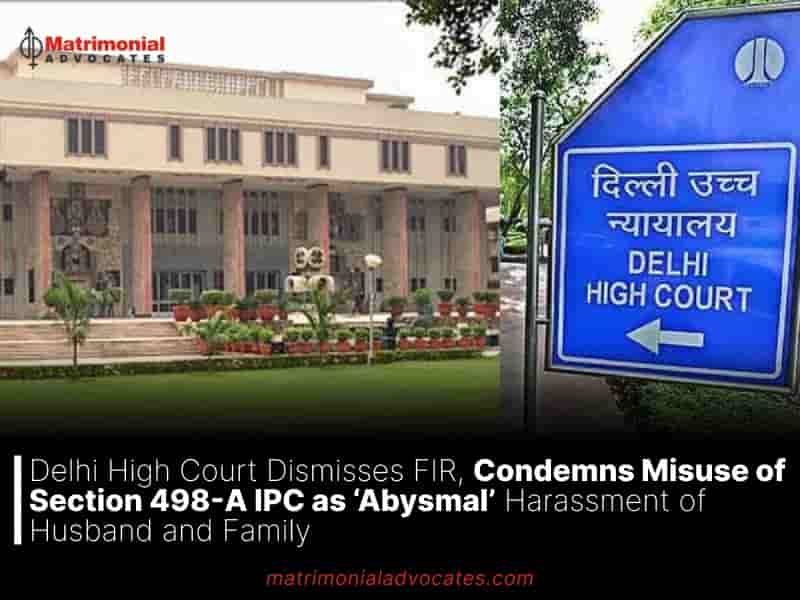
Such matters are now filed in the heat of the moment on advice of counsel by exaggerating and misconstruing actual events. However, this does not mean that genuine cases of harassment didn’t exist, and it is not blind to the ground reality of the deeply rooted social evil of greed for dowry.
The Delhi High Court, while considering a petition to quash an FIR dated 06-10-2017—filed under Sections 498-A and 342 of the Indian Penal Code, 1860 (‘IPC’)—highlighted the increasing trend of falsely implicating husbands and their families in matrimonial disputes. Justice Amit Mahajan observed that while Section 498-A was enacted to protect married women from harassment, its misuse to exert pressure on husbands and their families was a growing concern.
The Court stressed that when allegations are vague and filed after an unreasonable delay, allowing proceedings to continue would amount to an abuse of the legal process. Consequently, the FIR and all related proceedings were quashed.
Background
The FIR in question was lodged by Respondent 2 (the ‘wife’) against the petitioner (the ‘husband’) and his family, alleging harassment over dowry demands and the non-return of her stridhan. The couple was married on 25-12-2011, with claims that Rs. 10 lakhs were spent on the wedding.
As per the allegations, the husband, along with his father, mother, and brother, taunted the wife, asserting that despite his monthly income of Rs. 6 lakhs and receiving multiple marriage proposals, he chose to marry her believing that her father, a government officer, would match their social status.
It was further alleged that the husband’s family had expected a Honda City car and were disappointed that they had not even received a bike. They allegedly ridiculed the wife, accusing her father of being greedy for not providing gold items, a bike, or a car. Additionally, the husband and his father were accused of defaming the wife by questioning her character and refusing to return her stridhan despite repeated requests.
The husband, however, argued that he had been falsely implicated in the case. He claimed that the FIR was filed against him and his family to conceal his wife’s alleged extramarital affair. He stated that their separation occurred after he discovered photographs of his wife with another man, following which they mutually agreed to divorce before a biradri panchayat and subsequently filed a joint divorce petition. He further contended that the allegations in the FIR were vague and generalized, and allowing the legal proceedings to continue would constitute an abuse of the court’s process.
Analysis, Law, and Decision
The Court noted that if legal proceedings were found to be evidently frivolous, vexatious, or initiated with a malicious intent for revenge, it was essential to scrutinize the FIR with heightened caution. The High Court held the authority to evaluate the surrounding circumstances, review the case records, and read between the lines. If the allegations appeared exaggerated or suggested a misuse of Section 498A of the IPC, the Court could intervene under Section 482 of the Criminal Procedure Code, 1973.
Citing Achin Gupta v. State of Haryana, 2024 SCC OnLine SC 759, the Court pointed out that, like in that case, the present FIR contained broad and vague accusations against the husband, lacking specific details such as the date, time, or nature of the alleged dowry demands or harassment. The Court stressed that when an FIR is challenged as frivolous, it is the Court’s duty to look beyond the allegations and assess the broader context.
The Court further noted that in a complaint made by the wife’s father to the SHO on 09-05-2015, he alleged that the husband and his family had threatened to misuse certain obscene photos and videos to defame the wife’s family. However, the FIR itself contained no mention of such threats. Additionally, the complaint did not specify any particular incident of dowry-related harassment by the husband on that date. Based on these inconsistencies, the Court found merit in the husband’s argument that the allegations were an afterthought and a retaliatory move against the divorce petition.
The Court observed that on 23-08-2019, the husband had obtained a divorce decree on the grounds of cruelty, wherein it was noted that the wife had willingly engaged in physical intimacy with her boyfriend. Notably, the wife had not challenged this finding.
The Court also took note of the growing trend of implicating husbands and their families in matrimonial disputes. While Section 498-A of the IPC was enacted to safeguard married women from harassment, its misuse as a means to exert pressure on husbands and their families was a concerning issue. The Court observed that such cases were often filed impulsively, sometimes influenced by legal advice, with exaggerated or distorted claims. However, this did not diminish the reality of genuine cases of harassment.
Additionally, the Court acknowledged the persistent social evil of dowry-related greed, which had led to severe mistreatment and suffering for many victims. However, in cases like the present one, where allegations were vague and filed after a significant delay, allowing the legal proceedings to continue would constitute an abuse of the judicial process. As a result, the Court quashed the FIR along with all related proceedings.





